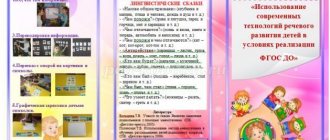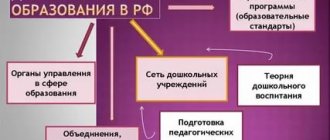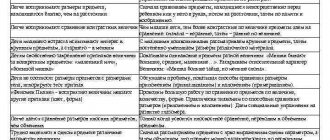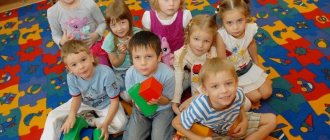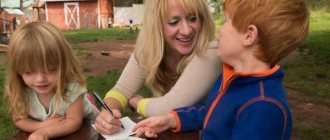Modern trends in preschool education
In accordance with the decision of the Council, the draft Federal State Educational Standard for preschool education was finalized and submitted for re-consideration. Based on the conclusions of 11 expert organizations and the recommendations of the working group of general education, the Council of the Ministry of Education and Science of the Russian Federation on federal state educational standards on August 28, 2013 decided to approve the Federal State Educational Standard for preschool education .
The introduction of the Federal State Educational Standard for Educational Education into practice will require the implementation of a number of activities, determining their nature and sequence.
Modern trends in the development of preschool education must first of all include:
Humanization of education – consideration of the child’s personality as the highest value of society, emphasis on the formation of a citizen with high intellectual, moral and physical qualities. And although the principle of humanization is one of the traditional general didactic principles, at the present stage of development of education its implementation is ensured by other conditions, first of all, the complexity of traditional and new trends in the functioning of the educational system.
Individualization as an effort is another traditional didactic principle of the need for an individual approach.
The implementation of this principle is manifested, first of all, in the organization of a personal-activity approach in education. The emergence of such an integrated, systematic approach to the upbringing and education of children is due not only to the natural development of pedagogical science, which, like any area of human activity, is characterized by a constant desire for progress, but also to the urgent crisis of the existing education system. A feature of this approach is the consideration of the learning process as a specific form of subjective-subjective relations between teacher and student. The very name of this approach emphasizes the relationship between its two main components: personal and activity.
The personal (or personality-oriented) approach assumes that the student with his individual psychological, age, gender and national characteristics is at the center of learning. Within the framework of this approach, training should be built taking into account the individual characteristics and “zone of proximal development” of the student. This consideration is manifested in the content of educational programs, forms of organization of the educational process and the nature of communication.
The essence of the activity component is that education contributes to the development of the individual only if it encourages him to take action. The significance of the activity and its result influences the effectiveness of a person’s mastery of universal human culture. When planning educational activities, it is necessary to take into account not only the general characteristics of the activity (objectivity, subjectivity, motivation, purposefulness, awareness), but also its structure (actions, operations) and components (subject, means, methods, product, result).
Love and discipline
— Let's talk about reforming the educational process itself. How do you imagine that?
— It all starts in kindergarten. On average, a child attends it for four years. First: we need to make sure that children feel comfortable in kindergartens. There should be no “gesture” there, like in Soviet kindergartens, when a child peed, they put him on the table, everyone points at him. Or they scold me. Or they cover their eyes with tape.
- No, they don’t do that now.
- Listen, they do it in ways you can’t even imagine. We have a lot of these stories, I could tell you, but I won’t. If a child cannot go to the toilet in kindergarten - he is embarrassed or afraid, and this happens all the time - it means something has happened. Maybe he was judged or laughed at. And educators should treat the child with care - as if they were their own, kindly, with acceptance. The child must acquire basic skills, but first of all, he must simply enjoy his entire childhood. Let him play pranks, run, play, sing, and so on.
- Again, now there are distortions when children are allowed to do whatever they want.
- Agree. Therefore there must be a balance. At Smile Fish we have two rails: love and discipline. Loving a child does not mean allowing him to jump on window sills, hit other children, or run out onto the roadway. Our love is expressed in ensuring that all children in the group feel relaxed, comfortable and, most importantly, safe. We give a certain amount of freedom to each child so that he feels at home.
Discipline is a must. There are psychological studies that when a child sees a leader and knows clear rules, then he feels safe under such control. And when everything is allowed to him, then he is slack, unbalanced, and from this he himself becomes nervous, begins to worry, and is afraid of everything. Therefore, naturally, in our kindergartens there is a clear daily routine: meal times, sleep times, classes, walks. In this case, the child develops a certain internal rhythm.
I would like to note the important mission of the educator. First of all, educators must love children and their profession, work out of vocation and not coercion. The task of a kindergarten teacher is to take care of the health and psychological comfort of all children. On the other hand, the teacher must see the talent in each child, because all children are unique. We believe that educators are generally one of the most important people in a child’s life. Remember Arina Rodionovna with little Sasha Pushkin - she was an ordinary teacher, nanny, and the great Russian poet immortalized her name in his works. This means she did something to unlock his potential, treated him kindly.
Our kindergartens have a “Pyramid of Growing Up” program. Relatively speaking, this is a triangle where the teacher, child and parent communicate with each other. All three of us must interact with each other without fear of communication. In this way, the child's strong traits can be developed. Later, the school teacher should take over the functions of the educator.
— Do you think that education is also primary at school?
- Certainly. Do you remember your first class? I remember well: many children, a huge office. And the teacher says: “Hello, children! Open page number...” And we sit scared at our desks, no one knows anyone. But I went to school as if it were a holiday. What should the teacher do? Build relationships. They gave him children for four years, so what are the grades, what is the first quarter? It doesn't matter at all. At first, especially when the weather is good outside, children with a teacher should walk in parks and so on. They need to get to know each other, become friends, and develop common rules. Can you imagine how more effective such children will be than others?
In elementary school, children are taught practical things that they then use throughout their lives. For example, I don’t remember much from the school curriculum - neither logarithms, nor what a synchrophasotron is, but every day I write, read, solve some kind of micro-equation. Therefore, the main thing for a teacher is insight; he must see the final product. What kind of people will my students become? What competencies will they have? What principles will I put into their lives? What fundamental truths will I give them?
And then this teacher must recommend to parents what talents to develop, so that from the fifth grade a set of lessons is optional. At this time, each child should already answer the question: what will I create? One may try his hand at medicine, while another dreams of becoming a blogger. Let the children experiment. The child must understand how he will improve his life, his country. See yourself in society, what contribution you will bring to this world. In addition, at school, in addition to basic subjects, you need to teach communication, friendship, family building, etiquette, and so on - remember the Smile Fish value wheel. Why not introduce lessons in public speaking and financial literacy - about banks, loans, mortgages? These should be items that are relevant today. Why aren't our children taught this? Why are they not taught life at all?
— What specialists does your company need?
- Different. For me, a higher education diploma is not an indicator at all. Naturally, professional preschool teachers and psychologists work in our kindergartens. But this is not a guarantee that a person will get a job with us. First of all, we give preference to people who really love children and have a lot of ideas, which means that during an interview they can immediately sing ten children’s songs, tell jokes, organize games, and make crafts from scrap materials.
Smile Fish
Positive dynamics
The least preschool education is available in Ingushetia (61.35%), Dagestan (67.7%), Tyva (79.6%), Ivanovo region (82.4%). Also among the lagging regions were the Novosibirsk region (88.1%), Transbaikal region (89.05%), Ryazan region (91.71%), Crimea (93.48%) and Tatarstan (93.27%).
Such conclusions can be drawn from a study by the Ministry of Education on the availability of preschool education in Russia for children under the age of three.
Not a child's business: Samara private kindergartens are being persecuted due to subsidies
Institutions had to provide services at a fixed cost in order to “unload” queues at municipal gardens
It also follows from the document that today only 37 regions are ready to provide 100% of the needs of the youngest preschool children. These include the YNAO, NAO, Belgorod, Bryansk, Vladimir, Volgograd, Voronezh, Kaliningrad, Kirov, Kostroma, Kursk, Leningrad, Ulyanovsk, Tula, Tver, Tambov, Saratov, Pskov, Penza, Oryol, Omsk, Novgorod, Nizhny Novgorod, Moscow , Magadan region, Khakassia, Mordovia, Kalmykia, Karachay-Cherkessia, North Ossetia, Adygea, Altai, Bashkiria, Krasnodar, Khabarovsk, Perm and Primorsky territories.
In the rest, this share is 93–99%. The federal cities of Moscow (99.5%) and St. Petersburg (99.97%) also fall into this category.
As Izvestia was told by the press service of the Ministry of Education, increasing and maintaining 100% accessibility of all levels of education is a key task, the implementation of which makes it possible to create equal conditions for children, regardless of place of residence.
Not always ready2
Photo: Moscow city news agency
Hang up: why children's development has slowed down
Increased time spent with gadgets during the pandemic has had a negative impact on preschoolers
— Back in 2021, the availability of preschool education for children under three years of age did not exceed 78% across the country. Thanks to active work to create new places in nurseries and kindergartens, this figure was significantly increased. According to the Russian Ministry of Education, the availability of preschool education for children aged two months to three years, as of July 1, 2021, was more than 98%, the ministry emphasized.
As the press service clarified, the task of achieving and maintaining 100% accessibility of preschool education in the regions of Russia is being solved primarily through the creation of additional places under the federal project “Employment Promotion” of the national project “Demography”.
— Despite the epidemiological situation, work has continued to create new places in nurseries and kindergartens. At the end of 2021, 75,853 places were created for children under three years of age. In 2021, it is planned to create over 73,500 more places. At the same time, special attention is paid to the construction of new facilities in rural areas, equipping them with modern equipment in all regions of the country, the Ministry of Education assured.
Izvestia turned to the lagging regions for comments.
